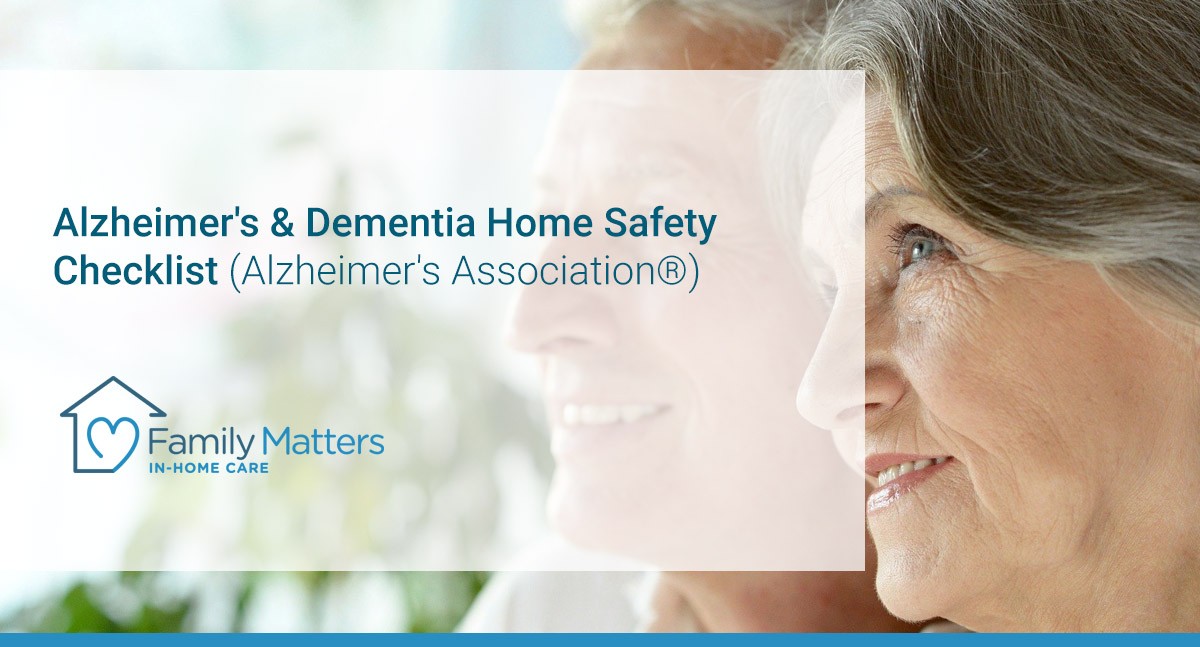
Alzheimer’s & Dementia Home Safety Checklist (Alzheimer’s Association®)
Individuals living with Alzheimer’s disease and other dementias are at increased risk for injury or harm in certain areas of the home. As the disease progresses, they may become unaware of the dangers that exist. Consider taking the following precautions to create a safe environment which can prevent dangerous situations from occurring and help maximize independence for as long as possible.
Download this Alzheimer’s & Dementia Home Safety Checklist as a PDF
General Home Safety Tips
- Store potentially hazardous items, such as medication, alcohol, matches, sharp objects or small appliances and tools, in a securely locked cabinet.
- Keep all cleaning products, such as liquid laundry pacs and bleach, out of sight or secured to avoid possible ingestion of harmful chemicals.
- Keep the number for the local poison control center posted by the telephone in case of emergency.
- Make sure carbon monoxide, smoke detectors and fire extinguishers are available and inspected regularly. Replace batteries twice a year during daylight saving time.
- Remove tripping hazards, such as throw rugs, extension cords and excessive clutter.
- Keep walkways and rooms well lit.
- Secure large furniture, such as book shelves, cabinets or large TVs, to prevent tipping.
- Ensure chairs have arm rests to provide support when going from a sitting to standing position.
- Apply stickers to glass doors at eye-level to ensure doors are visible.
- Install a latch or deadbolt on all doors that is either above or below eye-level.
- Remove locks on interior doors to prevent the person with dementia from locking themselves in.
- Consider removing firearms from the home or storing them in a locked cabinet.
- Enroll in a wandering response service.
Kitchen
- Use appliances that have an auto shut-off feature.
- Prevent unsafe stove usage by applying stove knob covers, removing knobs or turning off the gas when the stove is not in use.
- Disconnect the garbage disposal.
- Mark food with purchase date ; regularly check for and throw away expired items.
- Discard toxic plants and decorative fruits that may be mistaken for real food.
- Remove vitamins, prescription drugs, sugar substitutes and seasonings from the kitchen table and counters.
Laundry Room
- Clean out lint screens and dryer ducts regularly to prevent fires.
- Consider installing safety locks on washing machines and dryers to prevent inappropriate items being put in or taken out too early.
- Install locks on laundry chutes to avoid temptation to climb into or drop inappropriate items down the chute.
- Keep all cleaning products, such as liquid laundry pacs and bleach, out of sight or secured to avoid possible ingestion of harmful chemicals.
Bathroom
- Install grab bars for the shower, tub and toilet to provide additional support.
- Set the water temperature at 120 degrees Fahrenheit or less to prevent scalding.
- Apply textured stickers to slippery surfaces to prevent falls.
Bedroom
- Closely monitor the use of an electric blanket, heater or heating pad to prevent burns or other injuries.
- Provide seating near the bed to help with dressing.
- Ensure closet shelves are at an accessible height so that items are easy to reach, which may prevent the person from climbing shelves or objects falling from overhead.
Garage and Basement
- Limit access to large equipment, such as lawn mowers, weed trimmers or snow blowers.
- Keep poisonous chemicals, such as gasoline or paint thinner, out of reach.
- Lock and properly store ladders when not in use to prevent a tripping or climbing hazard.
- Remove access to car keys if the individual with dementia is no longer driving.
- Install a motion sensor on the garage door.
- Mark stairs with bright tape and ensure railings are sturdy and secure to prevent tripping or falls.
Download this Alzheimer’s & Dementia Home Safety Checklist as a PDF
This list has been made available courtesy of alz.org. For additional information, tools, and resources for understanding life and caregiving with Alzheimer’s and dementia, visit alz.org/help-support/resources.
If you or your family member is considering in-home care as part of a plan to age in place, contact Family Matters In-Home Care today for a free consultation. Our team is dedicated to supporting your family and helping older adults enjoy life in the comfort of their own home for as long as possible.
Some of the services offered by Family Matter In-Home Care include: Alzheimer’s & Dementia Care, Bed & Wheelchair Transfer Assistance, Companionship, Housekeeping & Meal Preparation, Personal Care, Recovery Care, and Transportation.
Serving the San Francisco Bay Area and Greater San Diego, Family Matter In-Home Care has offices throughout California including: Campbell, CA, Roseville, CA, San Marcos, CA, and San Mateo, CA.
